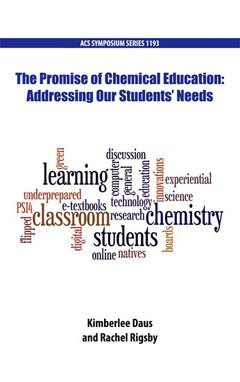Description
The Promise of Chemical Education
ACS Symposium Series
Coordinators: Daus Kimberlee, Rigsby Rachel
Language: English
Subject for The Promise of Chemical Education:
Publication date: 05-2016
144 p. · 17.1x23.1 cm · Hardback
144 p. · 17.1x23.1 cm · Hardback
Description
/li>Biography
/li>
College and university faculty find themselves tasked with teaching in the face of ever-changing trends in higher education and constant shifts in the student population. Educators must balance student engagement and retention with their learning and satisfaction in a never-ending cycle of changes in technology, the economy, and the political climate. Even when certain pedagogies or classroom techniques are shown to be beneficial in one discipline, individual faculty may find it challenging to apply them in their own classrooms. This is certainly true in chemistry. Many faculty in chemistry today struggle to embrace research-based educational practices, even those coming out of our own discipline. Graduate programs in chemical education, recent reports on discipline-based education research (1), and an increase in the scholarship of teaching and learning in chemistry indicate a desire among many faculty to change-to reach students in new and exciting ways or to change curricula to better meet students' needs. Faculty are looking for things that work-techniques used by chemists, for chemists. This volume contributes to this on-going conversation. The scholarship presented within this volume is organized in three sections. The first explores innovations found to enhance the learning of typical students as well as those who may be under-prepared. Authors describe their experiences using the flipped classroom and institutional readiness models. The second section provides examples of how technology may be utilized in the chemistry classroom-from e-textbook usage to a computational chemistry program to concrete suggestions for teaching chemistry online. The final section addresses broader issues in chemistry. One chapter demonstrates how to incorporate High-Impact Educational Practices (2) into courses for chemistry majors and nonmajors. A final chapter describes how colleges can adopt the Green Chemistry Commitment. Additionally, contextual information for pedagogical change may be found in the Introduction as well as helpful tips for adopting new approaches.
Kimberlee Daus received her B.S. and Ph.D. in Chemistry from the University of Tennessee at Knoxville and is now a Professor of Chemistry and Belmont University. She is an avid adopter of active-based learning and was the 2014 recipient of Belmont's teaching award. Rachel Rigsby received a B.A. in Chemistry from Kentucky Wesleyan College in 2000 and a Ph.D. in Chemistry from Vanderbilt University in 2005. She is currently an Associate Professor of Chemistry at Belmont University in Nashville, Tennessee.
© 2024 LAVOISIER S.A.S.

